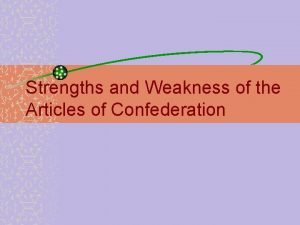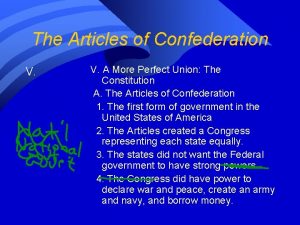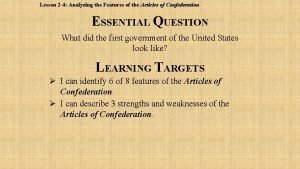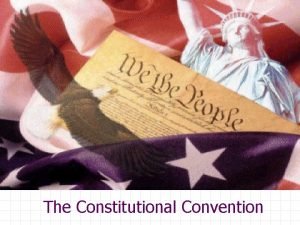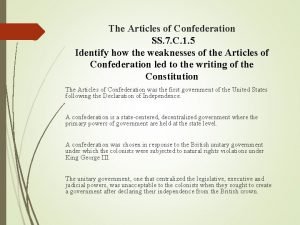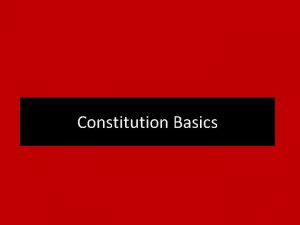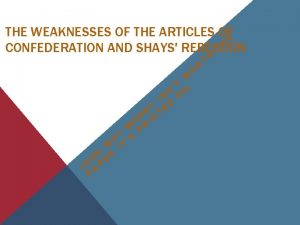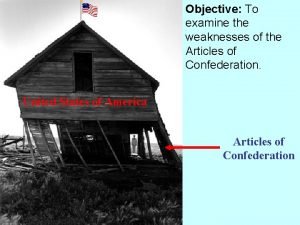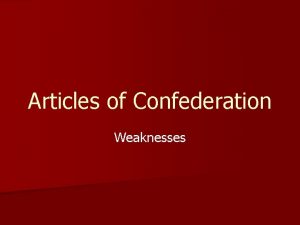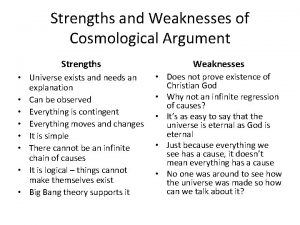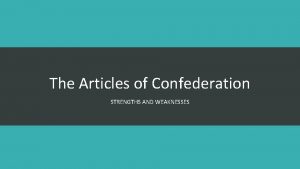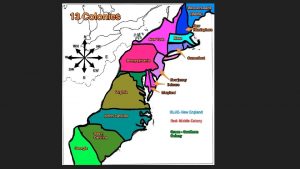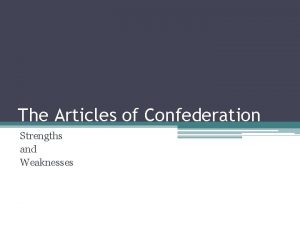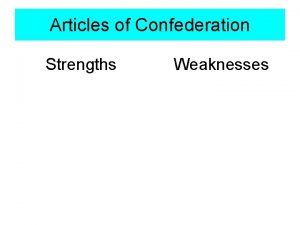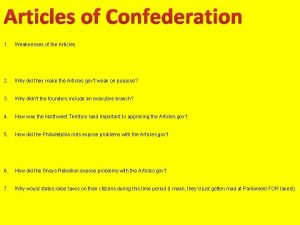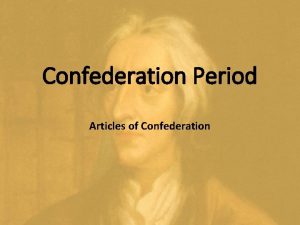THE CONFEDERATION Strengths and Weaknesses of the Articles











- Slides: 11

THE CONFEDERATION Strengths and Weaknesses of the Articles of Confederation

Strengths of the Articles • Governed the nation during & after the American Revolution • Ability to wage war and make peace • Sign treaties (like Treaty of Paris 1783) • Authority to conduct foreign affairs – Maintain relations with foreign countries • Borrow money • Issue currency – Print & circulate money

Weaknesses of the Articles • Gave the national government very few powers – Americans were afraid that a strong government would lead to tyranny • Each state had only one vote in Congress • Left most important powers to the state governments • The Articles of Confederation were a reactionary response to the issues the colonists had opposed under English rule

Legislative (Congress) Defense – Foreign relations problems • Spain wants to limit U. S. access to New Orleans • Britain still has troops in forts on U. S. land (Fort Detroit) • Mediterranean pirates kidnapping American sailors

Legislative (Congress) • Representation All states have one vote in Congress no matter how large or small their population

Legislative (Congress) • Trade – Congress can’t regulate trade with foreign countries – Congress can’t regulate trade between states (interstate trade)

Legislative (Congress) Sovereignty • States have the final authority on all laws passed by Congress “I do not conceive we can exist long as a nation without…a power which will saturate the whole Union in as energetic manner as the authority of the state governments extends over each state. ” - George Washington

Executive (President) • There isn’t one NO ONE to ensure that the laws are carried out

Judicial (courts) • No national court, court only state courts. • NO ONE to administer justice and interpret the laws for the national government

Constitutional Convention (1787) • January 21, 1786 Virginia Legislature invited delegates from all states to Annapolis, Maryland, for Annapolis Convention – Only few state delegates in attendance – Proposed all states meet in Philadelphia on May 14, 1787 to discuss ways to improve Articles of Confederation in a "Grand Convention. “ “I am mortified beyond expression, that in the moment of our independence we should by our conduct render ourselves ridiculous and contemptible in the eyes of all Europe. ” - George Washington

Military Shays' Rebellion • Property was going to be auctioned off for failure to pay debt; and debtors were to be thrown in jail • A group of farmers and Rev. War veterans upset about taxes that they could not pay started a rebellion, lead by Daniel Shays • Confederation Congress had no power to form a national army to “We are all in dire apprehension that a beginning of anarchy with put down the rebellion • Rebellion put down by militias paid for by wealthy citizens all its calamitys has approached, and have no means to stop the dreadful work. ” - Richard Henry Lee
 Articles of confederation strengths and weaknesses
Articles of confederation strengths and weaknesses Weakness and strengths of the articles of confederation
Weakness and strengths of the articles of confederation Articles of confederation strengths
Articles of confederation strengths Articles of confederation strengths
Articles of confederation strengths Strengths of the articles of confederation
Strengths of the articles of confederation Political weaknesses of the articles of confederation
Political weaknesses of the articles of confederation When was the great compromise
When was the great compromise Weaknesses of the articles of confederation
Weaknesses of the articles of confederation Weaknesses of articles of confederation
Weaknesses of articles of confederation Achievements of the articles of confederation
Achievements of the articles of confederation Problems of articles of confederation
Problems of articles of confederation Articles of confederation fail
Articles of confederation fail

